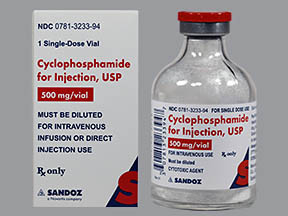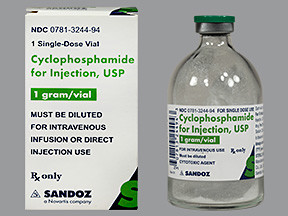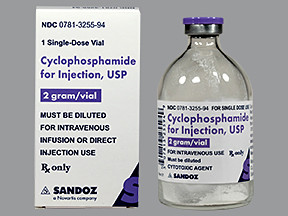CYCLOPHOSPHAMIDE - INJECTION
PHONETIC PRONUNCIATION: (sye-klo-FOSS-fuh-mide)
COMMON BRAND NAME(S): Cytoxan
GENERIC NAME(S): cyclophosphamide
Uses
USES: Cyclophosphamide is used to treat various types of cancer. It is a chemotherapy drug that works by slowing or stopping cell growth. Cyclophosphamide also works by decreasing your immune system's response to various diseases. It is used to treat a certain type of kidney disease in children after other treatments have not worked.
How to use CYCLOPHOSPHAMIDE - INJECTION
HOW TO USE: This medication is usually given by injection into a vein by a health care professional. The dosage is based on your medical condition, weight, response to treatment, and other treatments (such as other chemotherapy drugs, radiation) you may be receiving. Be sure to tell your doctor and pharmacist about all the products you use (including prescription drugs, nonprescription drugs, and herbal products). During treatment with this medication, it is important that you take in more fluids than usual and pass urine frequently to help avoid kidney and bladder side effects. Intravenous fluids should be given with this medication. Also, ask your doctor how much fluid you should drink and how often to empty your bladder each day, and follow these instructions carefully.
Side Effects
Precautions
Interactions
Overdose
Images
Reviews
Faq for CYCLOPHOSPHAMIDE - INJECTION
Cyclophosphamide injection is commonly used to treat various types of cancer, including leukemia, lymphoma, and multiple myeloma. It may also be used in combination with other medications to suppress the immune system and prevent organ rejection in transplant patients.
Cyclophosphamide injection is typically given directly into a vein (intravenously) by a healthcare professional. The dosage and frequency of administration will depend on the specific condition being treated and the patient's individual factors.
Common side effects of cyclophosphamide injection may include nausea, vomiting, diarrhea, hair loss, mouth sores, decreased appetite, and low blood cell counts. It may also increase the risk of infection and certain types of cancer.
Yes, cyclophosphamide injection should not be used in patients with a known allergy or hypersensitivity to the medication. It can also cause serious damage to the bladder, so it is important to stay well-hydrated during treatment. Close monitoring of kidney function and blood cell counts is necessary during treatment.
Yes, cyclophosphamide injection may interact with other medications, including certain antibiotics, antiviral drugs, immunosuppressants, and vaccines. It is important to inform your healthcare provider about all medications you are taking before starting treatment with cyclophosphamide injection.
Cyclophosphamide injection is known to cause harm to unborn babies and can pass into breast milk. It should not be used during pregnancy or breastfeeding unless the potential benefits outweigh the risks. Women of childbearing age should use effective contraception during treatment.
If you miss a dose, it is important to contact your healthcare provider as soon as possible to determine the best course of action. Do not try to make up for a missed dose by taking extra medication.
Cyclophosphamide injection is usually given in a medical setting, such as a hospital or clinic, by a trained healthcare professional. However, in some cases, it may be possible to administer the medication at home under the guidance of a healthcare provider.
The duration of treatment with cyclophosphamide injection will vary depending on the specific condition being treated and the individual patient's response. It may be given as a single dose or in cycles, with rest periods in between.
Disclaimer
IMPORTANT: HOW TO USE THIS INFORMATION: This is a summary and does NOT have all possible information about this product. This information does not assure that this product is safe, effective, or appropriate for you. This information is not individual medical advice and does not substitute for the advice of your health care professional. Always ask your health care professional for complete information about this product and your specific health needs.




No Reviews Yet